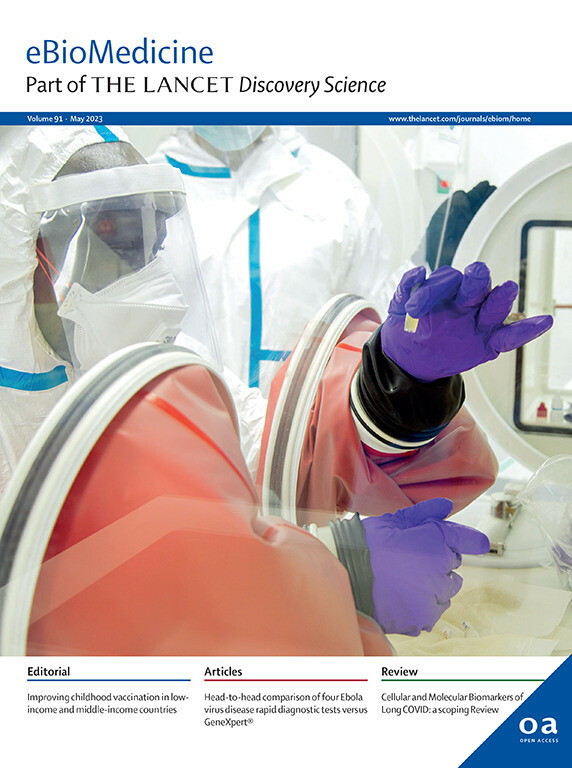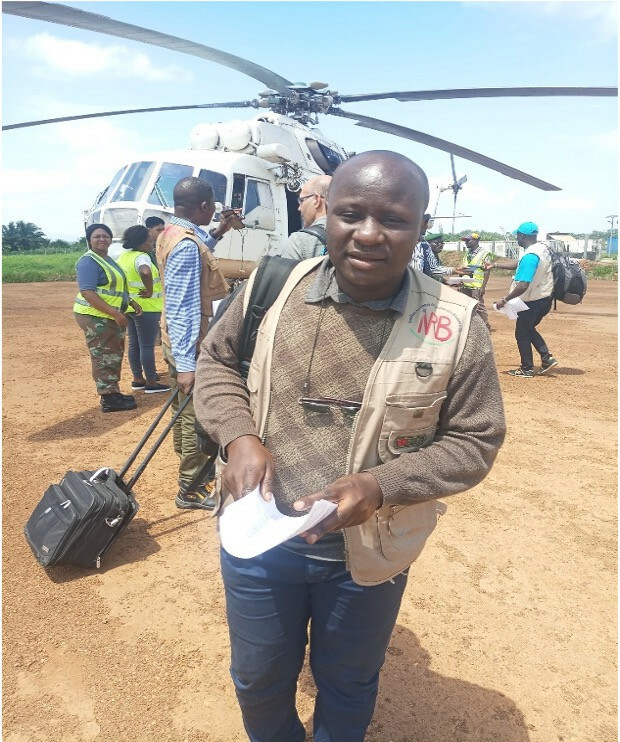"You're our best man for the job...": How a phone call jumpstarted my career


Recent appearances in internationally renowned scientific journals have made you a famous researcher. At ITM, we know you as our PhD alumnus. Could you share how you became a researcher and what led you to work on Ebola?
After completing my medical studies, I started my specialisation in medical biology and virology at Kinshasa University in 2012. My first research activities focused on sexually transmitted infections such as HIV and hepatitis among men who have sex with men; and arboviruses such as dengue and chikungunya. During this time, I was also completing my field research activities at INRB, and I became involved in an mpox outbreak investigation together with the US Centers for Diseases Control and Prevention and Kinshasa School of Public Health in 2013.
My involvement with Ebola began in 2015 at INRB. We were searching for Ebola antibodies among healthcare workers and Ebola survivors from the 1995 Kikwit and the 1976 Yambuku outbreaks. Dedicating my career solely to Ebola wasn't my plan, but one thing led to another. In 2017, with an international research team we conducted a survey on Ebola virus reservoir among bats, rodents and other small mammals. In May 2018 I was called back to my country, I went to Equateur province to coordinate Ebola diagnostics, first beside INRB’s Dr Placide Mbala, thereafter alone, in Iboko and Itipo villages.

You were about to take up a PhD at the Robert Koch Institute in Berlin. But then came a call that changed those plans?
Exactly. In 2017, I started a PhD programme with the Robert Koch Institute (RKI) in Berlin through a sandwich programme established between INRB and RKI in Berlin. In May 2018, an Ebola outbreak was declared in several places in Equator province. We confirmed the samples at INRB Kinshasa and were deployed at the three epicenters to implement diagnostics. Despite the challenges, we successfully controlled the outbreak within 2.5 months, which is exceptionally fast. But shortly after, another outbreak started in eastern DRC. Samples were tested by colleagues overnight. And at 5am the following day, Professor Steve Ahuka-Mundeke, the Head of the Virology Department and my advisor called me: “We have an Ebola outbreak in Beni.” I said, “but an outbreak just ended”. Also, we have rebels in that region.” He said, “this is why I have chosen you. You are the best man for this job”. And then he added, “I am not asking for advice, you need to go there. The flight will be waiting for you within thirty minutes and Professor Muyembe (Director of INRB) thinks that you can help.” There was no way to decline.
In August, we were deployed with lab-technician Bibiche Nsunda to set up a lab. We were the first folks from Kinshasa to be there on the ground, together with the Minister of Health and the Governor of North-Kivu province. Our lab was established in Beni, the headquarter of the response, where all the coordination meetings were held. There was a need to coordinate several newly set-up field laboratories, and I was appointed as field coordinator for the INRB laboratories during that outbreak.
The outbreak spread rapidly across multiple regions. How did you manage to control it?
The outbreak quickly spread across the North-Kivu, Ituri and South Kivu provinces. We quickly scaled-up the response by setting up field laboratories at the epicentres of the outbreak. In total, we implemented 13 field laboratories across 3 provinces of the eastern DRC, which I was overseeing under the direct supervision of Professor Ahuka-Mundeke and the leadership of Professor Muyembe-Tamfum. My team and I divided our efforts, working in different epicenters and using various field labs throughout the country. Additional support arrived as well, including Dr Anja De Weggheleire from ITM, who was stationed in Beni for a few days. Dr De Weggheleire came to visit me in the lab in Beni and said “I want you to come at ITM and start your PhD. “You will have good supervisors and a great research environment. The PhD track will go faster than where you are now”. Luckily, Prof Ahuka-Mundeke agreed to a PhD track at ITM.

I travelled to Antwerp for a month to meet my ITM promoters and discuss the subject of my thesis. But my second visit was cancelled due to the COVID-19 pandemic and the ensuing lockdowns, including Belgium and the DRC. So, I had to postpone my registration. We remained in the field to manage ongoing Ebola diagnostics, outbreak, emergency and laboratories management, data collection and paper writing.
How was your experience studying at ITM?
In November 2019, armed with preliminary data, I had the opportunity to meet my future PhD supervisors, Prof Dr Kevin Ariën and Prof Dr Johan van Griensven, during a visit to ITM. Their interest in my work, ongoing research collaboration, and the urgent need to test a collection of Ebola samples convinced them to support my PhD track at ITM. I finally enrolled in February 2021. Thanks to the preliminary data, the perfect alignment of ambitions, organisational talent, and the willingness of all institutions involved (University of Antwerp, INRB, ITM), I was able to complete my PhD track in about two years.
First you were thwarted by Ebola and then the arrival of the COVID-19 pandemic forced you to postpone your PhD at ITM. You jumped right in again?
As we were preparing to close the Ebola field laboratories and return to Kinshasa, COVID-19 reached Goma in March 2020, and our plans changed. Initially, my natural response was to return to my family due to exhaustion. “I’m so tired, let me go back home to see my family”, I said. However, the technical and logistical challenges demanded our attention, as there was a need to implement COVID-19 laboratories to support the diagnostics in eastern DRC. Professor Muyembe asked me to set up high security laboratories, and so the Goma branch of INRB was established. Goma is a perfect place for this because of its strategical position (border with Rwanda, internal harbor, proximity with Uganda) and international airport. When we started our COVID-19 response there, we needed to ensure a constant power supply, including fuel for the 24/7 operation of three power generators and secure resources for the survival of the laboratory. INRB helped a lot in the provision of reagents, supplies, and provided contacts and partnership. For a couple of weeks, the provincial authorities provided fuel for our generators to help running the lab. By August 2020, the situation improved, and it was decided that all travellers (domestic and international) had to pay their COVID-19 test before travelling. This allowed us to stabilise our financial needs.
You are now the Director of the National Institute of Biomedical Research (INRB) branch in Goma, the laboratory is named after Rodolphe Mérieux. Where did that name come from?
Indeed, my experience in the management of the field laboratories during the tenth Ebola outbreak in a context of high insecurity and political unrest ultimately helped to my appointment. We have received much support from the Mérieux Foundation, an independent foundation committed to fighting against infectious diseases. Professor Muyembe, the winner of the 2015 Christophe Mérieux Prize, advocated for our needs and highlighted the difficulties we faced despite the immense efforts and dedication of our team members, and other stakeholders. The Mérieux Foundation showed great interest in supporting our infrastructure needs.
“Technically speaking, the situation is stable. We are fully operational and can respond to any new virus attacks that might occur. But of course, paying staff and securing flanking costs stays a challenge.”
Daniel Mukadi-Bamuleka
With the situation currently stable, are there any ongoing challenges, both professionally and personally?
One of my priorities has been to empower and help the professional development of my staff. Those who worked during the Ebola and COVID-19 outbreaks urgently needed opportunities to enhance their skills. So far, we have successfully sent staff members to France, Tanzania, Senegal, Kenya, Japan, and to ITM in Belgium. We remain committed to be an important actor in capacity building efforts. Additionally, I am keen on continuing my "open doors" strategy; we set up collaborations with many national and international partners in the USA, France, Belgium, UK, Tanzania, Uganda, Kenya, Sierra Leone, Congo-Brazzaville. Establishing our presence in the region is an ongoing task. Personally, building connections and networks with the teams and other professionals abroad and in different field of research is crucial to me.
Rodolphe Mérieux Laboratory INRB-Goma (DRC)
"With co-funding from USAID, Mérieux Foundation sent laboratory containers by air to Kigali, Rwanda, then by route to the DRC. The infrastructure included high security BSL-3 & BSL-2 laboratory containers, a refrigerated storage container, three generators and a mobile BSL-2 facility in a vehicle. We added two cold storage units, a pathogen genomics laboratory, an immunology-serology laboratory, a clinical biology laboratory, a bacteriology laboratory, a conventional PCR laboratory, and an administrative building. Currently, we contribute to the surveillance of various diseases for several provinces in the east of the DRC, including Ebola virus disease, COVID-19, plague, cholera, mpox, Rift Valley fever, Marburg virus disease, bacterial meningitis etc."

Lastly, could you share your ambitions for the future?
(Smiles) That's a challenging question, and to be honest, I haven't discussed it before. For me, it's about sharing expertise, being active on an international and national level, attending lectures and conferences, and creating strong bonds. I find fulfillment in inspiring others to pursue scientific careers, given my own path and the multitude of experiences I have had. Following in the footsteps of Professor Muyembe, who has been an inspiration to me, is also one of my closest ambitions.
Lastly, I would like to express my gratitude for the quality of supervision I received at ITM Antwerp, which enabled me to complete this PhD journey. I have met wonderful people and felt at home in Antwerp. Special thanks to the Departments of Biomedical and Clinical Sciences, the student mobility admin staff, the Outbreak Research Team, ITM’s DRC Office, former director Marc-Alain Widdowson, and Lut Lynen, the current director. The entire ITM staff has been incredibly supportive throughout this process. Obviously, my home institution INRB with the leadership and vision of Professor Muyembe-Tamfum to train more and more PhDs, the support of my promoter in DRC, Professor Ahuka-Mundeke, my elders at INRB and University of Kinshasa, the staff of Virology Department at INRB HQ and my colleagues at the Rodolphe Mérieux INRB-Goma Laboratory.
Spread the word! Share this story on









